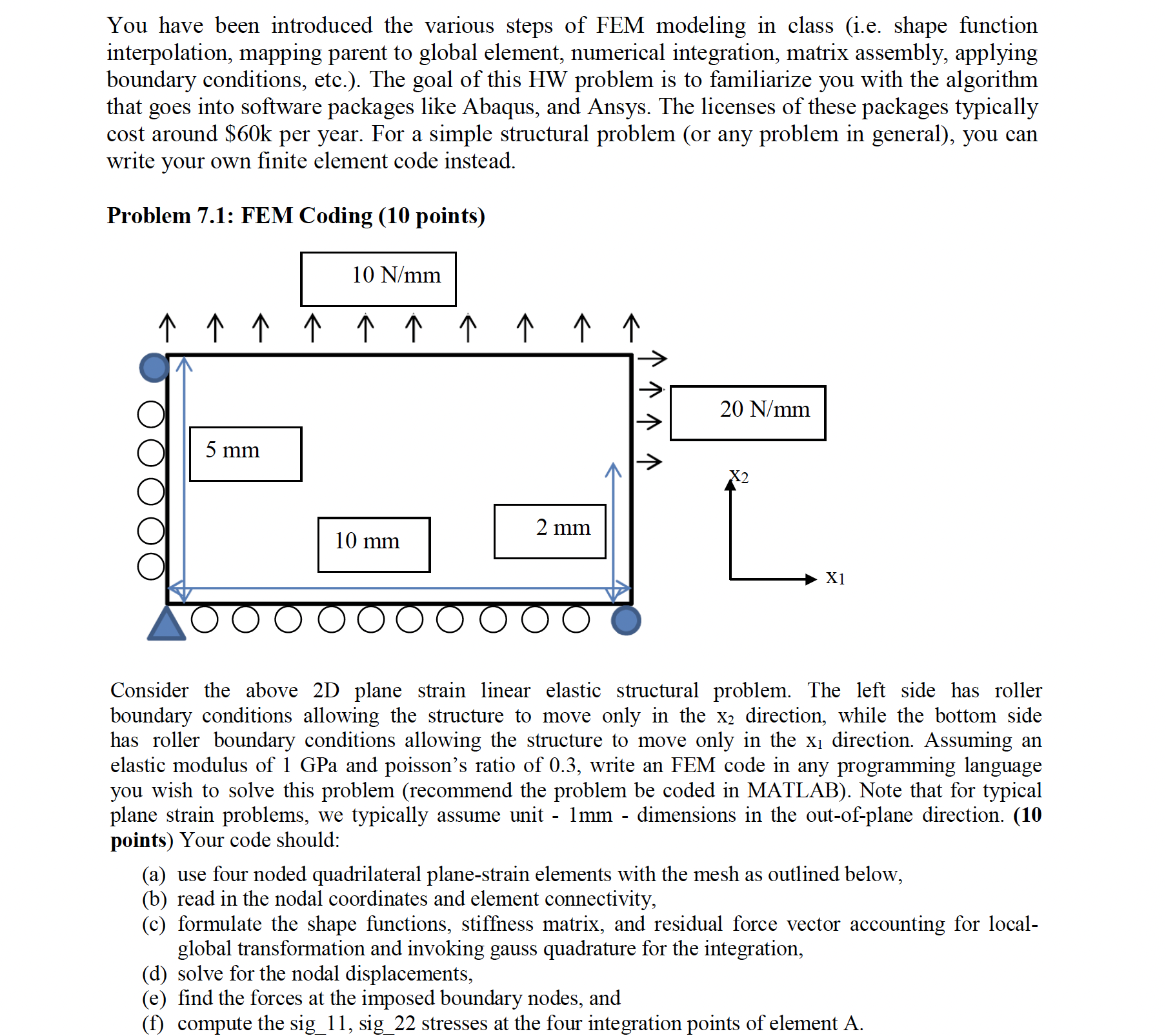Question
Image transcription text You have been introduced the various steps of FEM modeling in class (i.e. shape function interpolation, mapping parent to global element, numerical

Image transcription text
You have been introduced the various steps of FEM modeling in class (i.e. shape function interpolation, mapping parent to global element, numerical integration, matrix assembly, applying boundary conditions, etc.). The goal of this HW problem is to familiarize you with the algorithm that goes into software packages like Abaqus, and Ansys. The licenses of these packages typically cost around $60k per year. For a simple structural problem (or any problem in general), you can write your own finite element code instead. Problem 7.1: FEM Coding (10 points) 10 N/mm ttt'l't't'l'ttt Consider the above 2D plane strain linear elastic structural problem. The left side has roller boundary conditions allowing the structure to move only in the X2 direction, while the bottom side has roller boundary conditions allowing the structure to move only in the x1 direction. Assuming an elastic modulus of 1 GPa and poisson's ratio of 0.3, write an FEM code in any programming language you Wish to solve this problem (recommend the problem be coded in MATLAB). Note that for typical plane strain problems, we typically assume unit - 1mm - dimensions in the out-of—plane direction. (10 points) Your code should: (a) use four noded quadrilateral plane-strain elements with the me sh as outlined below, (b) read in the nodal coordinates and element connectivity, (c) formulate the shape functions, stiffness matrix, and residual force vector accounting for local- global transformation and invoking gauss quadrature for the integration, (d) solve for the nodal displacements, (e) find the forces at the imposed boundary nodes, and (f) compute the sigil l, sig722 stresses at the four integration points of element A.
You have been introduced the various steps of FEM modeling in class (i.e. shape function interpolation, mapping parent to global element, numerical integration, matrix assembly, applying boundary conditions, etc.). The goal of this HW problem is to familiarize you with the algorithm that goes into software packages like Abaqus, and Ansys. The licenses of these packages typically cost around $60k per year. For a simple structural problem (or any problem in general), you can write your own finite element code instead. Problem 7.1: FEM Coding (10 points) 10 N/mm 5 mm 10 mm 2 mm 20 N/mm X2 X1 Consider the above 2D plane strain linear elastic structural problem. The left side has roller boundary conditions allowing the structure to move only in the x2 direction, while the bottom side has roller boundary conditions allowing the structure to move only in the x direction. Assuming an elastic modulus of 1 GPa and poisson's ratio of 0.3, write an FEM code in any programming language you wish to solve this problem (recommend the problem be coded in MATLAB). Note that for typical plane strain problems, we typically assume unit - 1mm - dimensions in the out-of-plane direction. (10 points) Your code should: (a) use four noded quadrilateral plane-strain elements with the mesh as outlined below, (b) read in the nodal coordinates and element connectivity, (c) formulate the shape functions, stiffness matrix, and residual force vector accounting for local- global transformation and invoking gauss quadrature for the integration, (d) solve for the nodal displacements, (e) find the forces at the imposed boundary nodes, and (f) compute the sig_11, sig_22 stresses at the four integration points of element A.
Step by Step Solution
There are 3 Steps involved in it
Step: 1
Solutions Step 1 MATLAB code for FEM analysis of the given plane strain linear elastic structural problem FEM analysis of plane strain linear elastic structural problem Problem data E 1e9 Elastic modu...
Get Instant Access to Expert-Tailored Solutions
See step-by-step solutions with expert insights and AI powered tools for academic success
Step: 2

Step: 3

Ace Your Homework with AI
Get the answers you need in no time with our AI-driven, step-by-step assistance
Get Started


